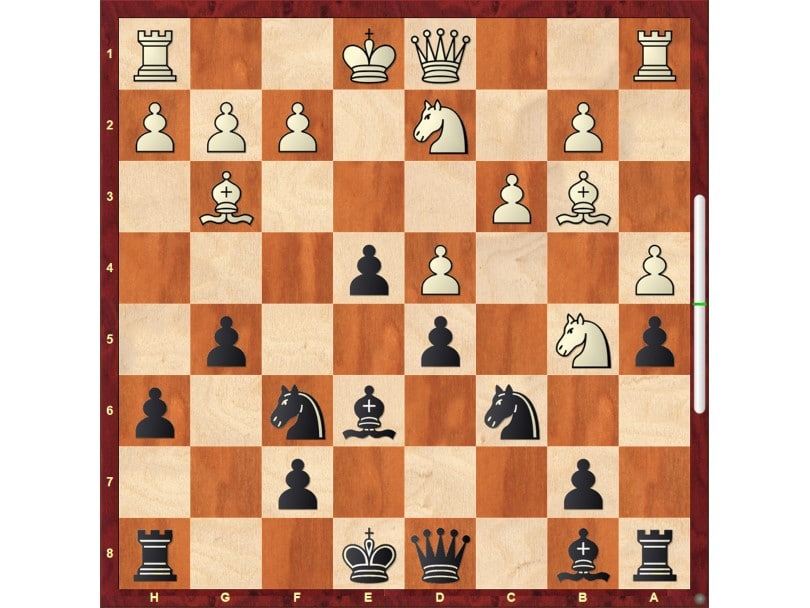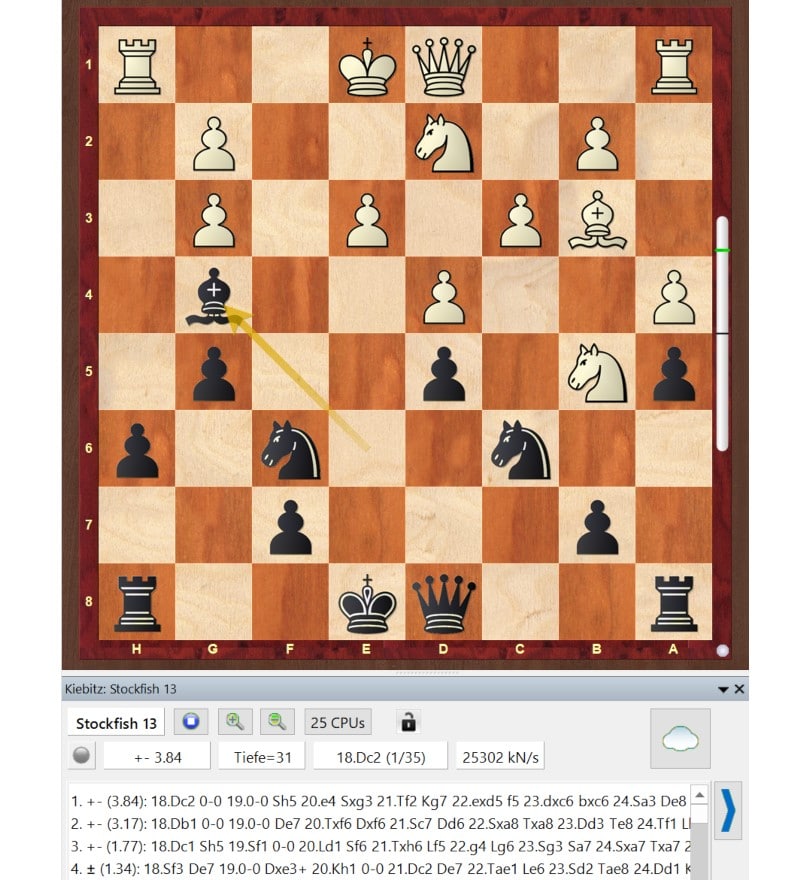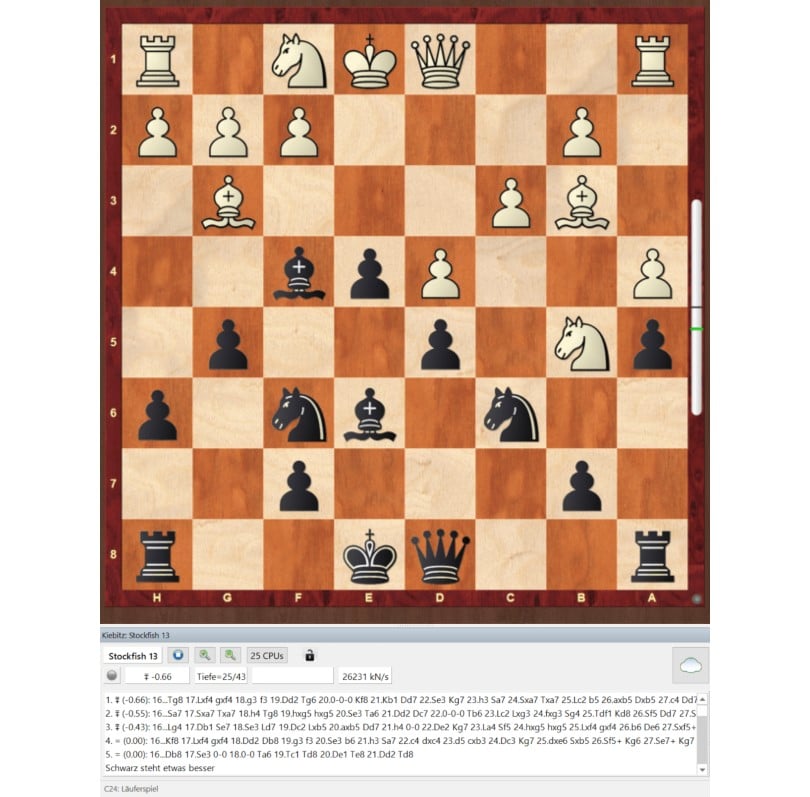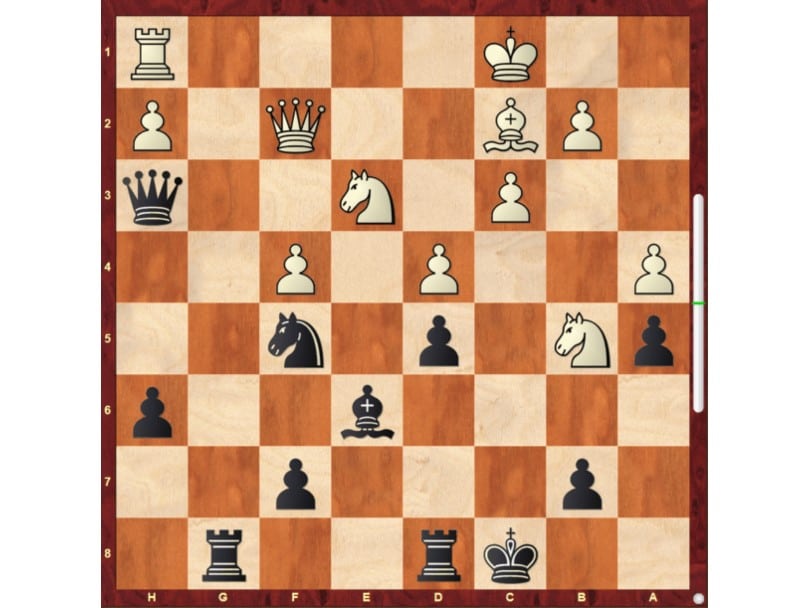In Part 1 I focused on the game analysis at the tournament. In Part 2, we will need some notes we did back then, it is vital that you read and do all the steps in Part 1 before reading this.
I usually take a break for some days after a tournament. This depends on the lengths and intensity of the tournament. A good rule of thumb for me is to take 1/3 of the tournament days as a break. So for a 9-round tournament, I will take 3 days to completely relax.
I understand this is hard to do for amateurs. If you cannot take 3 more days completely free, just make sure to get your mind off of chess for these days. You want to be fresh and motivated when looking at your games.
If you did Part 1 right, then you have a ChessBase or lichess folder with all your games from this tournament. They are lightly annotated and especially your feelings and some key variations are in there.
Understanding Your Mistakes With The Help Of An Engine
Now, it is time to go deeper and find out your key mistakes and faulty thought processes. Here is a secret I have focused on for a very long time:
A wrong thought process that produces the right move is much worse than the right thought process with the wrong outcome!
While you might get lucky once, it is clear that the wrong thought process will cost you in the future.
This is like hitting a Tennis serve with the wrong technique. While it might go well sometimes, over the long haul it will not serve you well. It is important to learn the right technique, even if this means some short-term losses.
That is why it is not enough to just check if your moves have been correct or not. It is trivial to understand HOW you get to your decisions (right or wrong). That is exactly why you should write down the lines, feelings, and thought processes immediately after a game. Now you can analyze all of it and learn a ton.
If you have a chance to go through this step with either a Coach or a higher-rated friend, then do it. Humans can not only understand your mistakes but also your fears and your decision-making. This can be extremely valuable.
As most people do not have the luck to have a good personal Coach, I will focus on analyzing the game by myself with the help of an Engine.
In a perfect world with more than 24 hours per day, I would recommend first again going through your games by yourself, trying to find more resources, and only in a third step checking the game with an Engine.
But I have long stopped doing this, so it would be hypocritical to suggest you should do so. And, I am also not sure anymore if the additional time spent is really worth it. That’s why now comes the time to switch on the Engine.
Focus On The Critical Moments
Let’s get back to my game against Oratovsky. The first critical moment arrived after 15.Bg3.

As written in Part 1, I felt extremely confident here. So, I started to look for direct ways to prove my advantage. One of them was 15…e3?. I gave the following line: 16.fxe3 Bxg3+ 17.hxg3 Bg4 18.Qc2 Qe7 19.0-0!. Only when I saw this resource did I decide against 15…e3. So, let us check how correct my calculation and evaluation were.
After 15…e3 the Engine shows immediately more than +2 for white. Now, I could just stop and think “well I decided against it, so that is fine”. But then I lose a big opportunity to learn.
I need to go deeper and find the origin of such a horrible move (even if I did not end up playing it). Let me check how many lines there are for white after my intended sacrifice 15…e3. And it is astonishing that either on move 18. or on move 19. white has several ways to be completely winning!

As you see any move that saves the Queen leads to a huge advantage! Now, what is the conclusion of this?
This is where my notes during the tournament get extremely important. I was already very confident and thus started to search for a (big) advantage.
As the position after move 15 is simply unclear and objectively equal, there is no advantage to be found.
So going for complications where the outcome should not be equal (I will dismiss equality because I want to find an advantage) which is super dangerous!
Focus On The Origin Of The Mistake
The origin of the mistake is the following: especially when facing lower-rated opponents, I still have the tendency to fall into wishful thinking.
I absolutely want to win the game, so I will search for advantages or even concrete winning lines in absolutely unclear positions!
Since there are no advantages, I am prone to risking too much, dismissing all equal lines, and playing something very dubious or just plainly bad!
In that example, my notes helped me find a huge source of mistakes in a line I even did not end up playing!
Let us see one more critical moment of the game. After 15…Bf4 16.Nf1?! Qe7? the Engine is again unhappy.
This is not surprising, as I missed something in the concrete line that followed in the game: 17.Bxf4 gxf4 18.Qd2 e3 19.fxe3 Ne4 20.Qe2 and now after Qh4+ there is 21.g3 fxg3 22.0-0-0! with a big advantage for white.
Certainly, my calculation was not good, as I should see that resource. But again it is not that easy. There is so much more to learn! In the position after 16.Nf1 I actually have 5 moves that keep the balance or are better for black! All of them have one thing in common: they are not giving up a pawn and forcing the play.

Even at the risk of repeating myself: the origin of the mistake was my mental state, not my calculation.
This time I could not hold myself from “going for it”. Instead of making a logical move, I tried to force-play with a very dubious pawn sacrifice. I simply did not want to play calm, and only searched for forced lines.
Look For What Is Not There
After controlling my comments and lines in the way I explained above, I started looking for things that are not there. Did I miss some tactics? Or are there resources I simply did not see at all? I am very strict with myself and use the following rule:
Whatever I did not mention in my Part 1 analysis counts as missed. Either I did not see it, or did not feel it was important.
One example would be the following position:

I am an exchange up and things look finally truly good for me. But I relaxed a bit too early because there is a very nice resource for white.
After 28.Nxf5 Bxf5 29.Qe2! (totally missed that) Bxc2 30.Qe5! Rd7 31.Na7+! Kd8 32.Qb8+ Ke7 33.Qxg8 I am very lucky to have Qe3+ 34.Kxc2 Qe4+ picks up the h1 rook and the fun continues.
This line is objectively equal, but anything can happen. There is a good possibility of me simply falling off my chair after 30.Qe5…
Again, I was too confident and thus missed a resource of my opponent. I should certainly work on my calculation skills, but more importantly, try to be guided less by my absolute wish to win.
A little bit more objectivity when playing against lower-rated opponents would definitely save me some points!
It might be a good time to remind myself (and you readers) that I wrote a nice article on that theme.
I am only going to find what I am looking for!
If I am looking for something that does not exist, it can cause big mistakes!
Conclusions
Let me make a summary of what my game analysis looks like:
- Immediately after the game, I put my game into Chessbase (you can also use lichess/study!)
- I note what I expected in the opening, and when my preparation ended.
- I add crucial lines, evaluations, and my feeling throughout the game.
- After the tournament, I go through my notes with an Engine (if you can do it with a Coach it is even better!)
- I focus on finding mistakes in my thought process; the origin of the mistake is the clue!
When finished with the first game, I just go on and do it with all my games from a tournament.
Every game is different, but usually, it is easy to understand some tendencies in faulty thought processes or clear weaknesses in your game.
Understanding such weaknesses is only the start of improvement. Without action, nothing will change!
So, it is extremely important to implement it immediately in the training process. It is hard working on several weaknesses at the same time. So I encourage you to focus only on ONE thing at a time. Make it simple and easy.
In my case, this is an ongoing process. I am very ambitious and that is a great strength. But if I get too ambitious and start not playing on the position, but my opponent, things can go wrong.
Before every game against a lower-rated opponent, I am telling myself to focus on the process, not the result.
I am working on enjoying the game, and not thinking of the result. I don’t have to play perfectly, I just have to play good moves. One after another. And then see what happens.
So what is it you learned about yourself when analyzing your games that way? Let me know in the comments, so I can help you improve it!
As always, I hope this helps. And don’t be sad to fuck up some games. It happens to everybody. Always remember, either you win, or you learn.
Sincerely,
Noël
P.S.: If you liked this article, then you will probably also like my FREE Guide to organize your Chess training. Get it here.